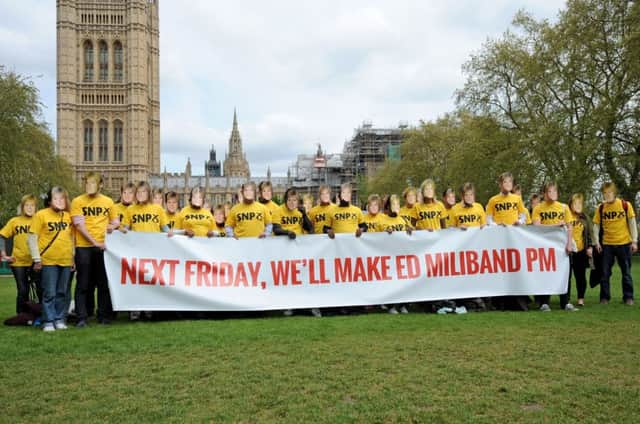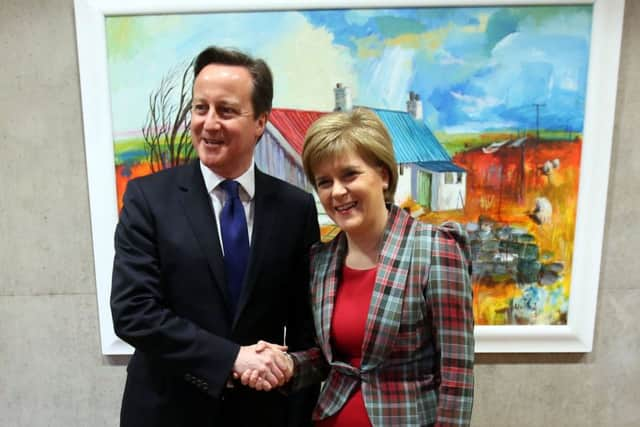Brian Monteith: SNP only cared about their voice


As the dust settles from the general election result and its historic outcome – historic in the scale of the SNP victory in Scotland and historic in the achievement of a surprise overall majority for the Conservatives – there are questions to be asked about how it was achieved.
One of those questions is how much Nicola Sturgeon contributed to David Cameron’s victory. This is important so as to remind Conservatives that they didn’t just win the election, other parties contributed by losing it; and it is important to other political parties because it might reveal the strategic errors to avoid before the 2016 Holyrood election.
Advertisement
Hide AdAdvertisement
Hide AdFirstly, it is necessary to remind everyone that the SNP’s impressive achievement of 56 out of 59 seats did not cost Labour the election. The arithmetic shows the Conservatives would still have enjoyed an overall majority even if Labour had won all 59 Scottish constituencies.


What cannot be denied, I believe, is that the prospect of the SNP winning enough of Labour’s Scottish seats to make it a power-broker influenced many people in England, and possibly Wales, to vote Conservative. I say this because during the election campaign I met many people from the Conservatives, Ukip, and of no party at all that told me voters were expressing concern about a left-wing Nicola Sturgeon winning all sorts of concessions from Ed Miliband if he were prime minister of a minority government.
To us in Scotland, this scenario had always been a likelihood, but for those in the rest of the UK, what had crystallised a possibility into a certainty was not just the polls that stubbornly refused to shift as the campaign ran out of time but the impressive performances of Sturgeon in the various TV debates. She came over as more articulate, persistent and quick on her feet than Miliband and more serious and driven than Alex Salmond before her. Everyone could see she would be able to out-think and outmanoeuvre Miliband if the British electorate gave her the chance.
At this point, it is worth stating that I write this column as someone who does not operate in the Holyrood political bubble. In my main profession as an international public relations consultant, I work between London, Edinburgh and overseas. This means I meet and mix with a wide variety of politicians, business people and professionals that have different insights and interests beyond the Scottish Parliament. It is a different world from my time as an MSP at Holyrood and I know it gives me a wider objectivity than that period when I always had to think about the next election I faced and looked at Scottish politics through that prism.
Much of the information and opinion I picked up during the election came from parts of England outside the metropolitan influence, while some people I met were part of the Westminster bubble. I found, on a regular basis, be it in the north, south, east or west of England – even from Labour voters – a concern about what influence the SNP might exert. Be it by the changing of UK economic policy that could unravel the past coalition’s hard-won recovery, the willingness of SNP MPs to vote on English-only spending decisions and laws, or them trying to change our nuclear defence posture, I found people anxious about the SNP.
Interestingly, I found it was the SNP’s left-of-Labour messaging that caused more concern than the prospect of the SNP in the future achieving Scottish independence – an issue that most people outside Scotland simply shrug their shoulders about and say, “Stay or go if you want, but come to a decision and stick to it”.
For those voters in the centre or right-of-centre in England that the SNP was urging to vote Green rather than Labour served only to confirm the SNP would be a malign influence. Urging English and Welsh voters to support Labour, rather than a party that would introduce punitive measures on Scotland’s precarious oil industry, could have given more reassurance about the SNP being a reasonable party that Miliband could do business with. Instead, Sturgeon sought to marginalise Miliband at every opportunity.
The other SNP message that caused people to ponder their votes was Sturgeon’s repeated insistence of her unwillingness to do any deal whatsoever with the Conservatives. Indeed, she boasted she wanted to “lock the Tories out”.
Advertisement
Hide AdAdvertisement
Hide AdAs others more sympathetic to the SNP than me have pointed out, this position meant that if the Conservatives were to form the government, then Scotland could lose out from gaining additional powers simply because of the SNP’s ideological blind spot on working with Tories. Not only was this strange, given that the SNP Scottish Government had relied upon Tory votes in Holyrood between 2007-11, it also demonstrated the SNP was prepared to put party before country.
The position also contradicted the SNP’s core campaign message of giving Scotland a stronger voice. How could this goal be achieved if the SNP would not talk to one half of the potential powers that be, and thus could not be heard, even if a new Conservative or Conservative-led government expressed a willingness to listen and do business?
For many in England, the only way to lock out the SNP was to vote Conservative, because voting for anyone else, even Liberal Democrat, was to run the risk of the SNP having some leverage. Ukip people complained to me that some supporters were returning to the Conservative fold, while Tories confirmed this intelligence. Cameron’s campaign seized the moment and campaigned on the issue incessantly.
This brings us to the next question that must be asked: why, if Sturgeon was so committed to stopping a Conservative government, did she not do more to help Labour in England and Wales by advocating support for Miliband, dampening-down her left-of-centre rhetoric to appear less of a threat, and expressing a reasonableness in being willing to work with any UK government? Surely the SNP’s own political intelligence told Sturgeon she was scaring voters into voting Tory?
The only conclusion is that defeating “Blue Labour” in Scotland was more important than anything else. The SNP is now in pole position to win the Holyrood elections in 2016 which, following the referendum defeat, has always been its goal. Only through four more years of power can it do what it wants, including a second referendum, and that comes before a stronger voice for Scotland.